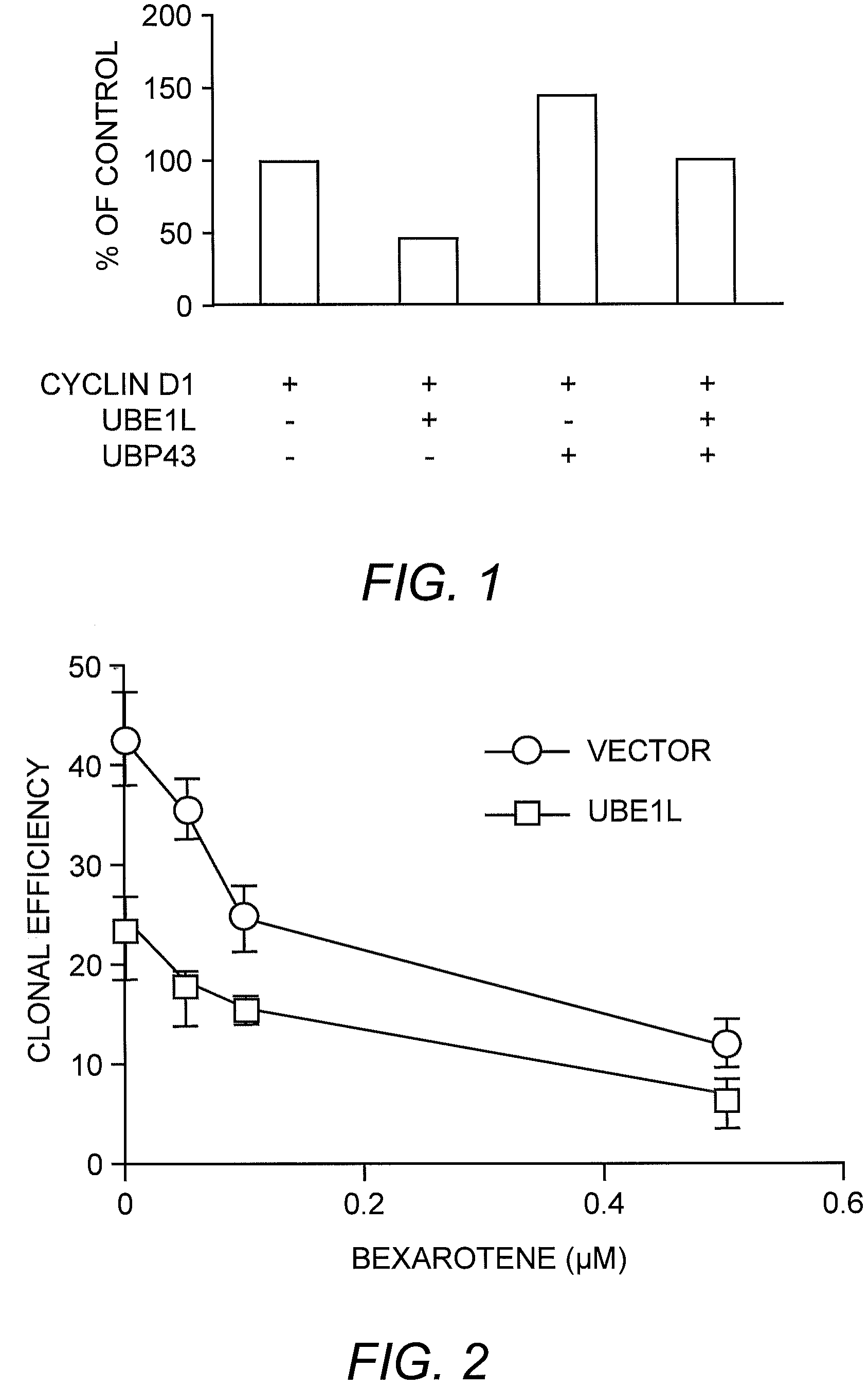Compositions and methods for preventing and treating cancer via modulating UBE1L, ISG15 and/or UBP43
a technology of ube and modulation, applied in the direction of drug compositions, viruses/bacteriophages, organic chemistry, etc., to achieve the effect of enhancing pro-apoptotic and degradative pathways
- Summary
- Abstract
- Description
- Claims
- Application Information
AI Technical Summary
Benefits of technology
Problems solved by technology
Method used
Image
Examples
example 1
Materials and Methods
[0030]Cell Culture and Induction Protocol. RA and dimethyl sulfoxide (DMSO) were purchased from Sigma Chemical Company (St. Louis, Mo.). Stock RA (10 mM) solutions were dissolved in DMSO, stored in liquid nitrogen, and used in the dark during experiments. RPMI-1640 and DMEM were purchased from Cellgro / Mediatech (Herndon, Va.).
[0031]The NB4 APL cell line expresses PML / RARα (Lanotte, et al. (1991) Blood 77:1080-1086). NB4-S1 and NB4-R1 are RA-sensitive and RA-resistant clones of NB4 cells, respectively (Nason-Burchanel, et al. (1997) Differentiation 61:321-331). These cells were cultured in RPMI-1640 medium supplemented with 10% FBS (see, Nason-Burchenal et al. (1997) supra).
[0032]Chinese hamster ovary (CHO) cells were cultured in DMEM supplemented with 5% FBS, 100 units / ml penicillin, 100 units / ml streptomycin, and 2 mM L-glutamine in a 5% CO2 humidified incubator at 37° C.
[0033]Human bronchial epithelial cells (BEAS-2B) were cultured in serum-free LHC-9 medium (...
example 2
Role of UBE1L and the UBE1L-Dependent Pathway in APL
[0049]All-trans-retinoic acid (RA) treatment induces remissions in acute promyelocytic leukemia (APL) cases expressing the t(15; 17) gene product, promyelocytic leukemia (PML) / retinoic acid receptors (PML / RARα). Microarray analyses have revealed induction of UBE1L (ubiquitin-activating enzyme E1-like) after RA treatment of NB4 APL cells. The kinetics of this induction was studied in RA-sensitive NB4-S1 APL cells using a reverse transcription-PCR assay. UBE1L mRNA induction occurred by three hours after 10 μM RA treatment. These results were independently confirmed by northern analysis and after 1 μM RA treatment by reverse transcription-PCR assay. In contrast, UBE1L expression was not induced during the same time period, despite 10 μM RA treatment of the RA-resistant NB4-R1 cell line. This is indicative of UBE1L being a direct retinoid target.
[0050]Further, the direct relationship between UBE1L induction and effective retinoid trea...
example 3
UBE1L Causes Lung Cancer Growth Suppression by Targeting Cyclin D1
[0062]UBE1L is implicated as a molecular pharmacologic target inhibiting cyclin D1. This has provided a mechanism for the tumor suppressive role of UBE1L. To determine whether UBE1L affects cyclin expression, BEAS-2B cells were co-transfected with UBE1L and independently with cyclin D1, cyclin D2, cyclin D3 or cyclin E. Only cyclin D1 was inhibited by UBE1L and actin expression was unaffected.
[0063]Immunoblot experiments were conducted following transfection of UBP43, the enzyme leading to ISG15 deconjugation. Dose-dependent effects in BEAS-2B cells of transient UBP43 transfection were observed on cyclin D1 protein. Cyclin D1 expression increased as UBP43 transfection dosage increased. UBE1L transfection inhibited cyclin D1 expression in BEAS-2B cells, but UBP43 co-transfection antagonized this effect (FIG. 1). To establish UBE1L affected cyclin D1 protein stability, UBE1L was co-transfected with HA-tagged cyclin D1 i...
PUM
| Property | Measurement | Unit |
|---|---|---|
| binding affinity | aaaaa | aaaaa |
| concentration | aaaaa | aaaaa |
| length | aaaaa | aaaaa |
Abstract
Description
Claims
Application Information
 Login to View More
Login to View More - R&D
- Intellectual Property
- Life Sciences
- Materials
- Tech Scout
- Unparalleled Data Quality
- Higher Quality Content
- 60% Fewer Hallucinations
Browse by: Latest US Patents, China's latest patents, Technical Efficacy Thesaurus, Application Domain, Technology Topic, Popular Technical Reports.
© 2025 PatSnap. All rights reserved.Legal|Privacy policy|Modern Slavery Act Transparency Statement|Sitemap|About US| Contact US: help@patsnap.com

